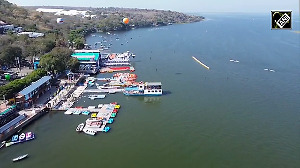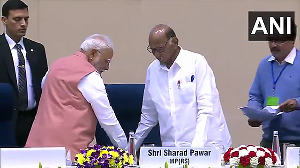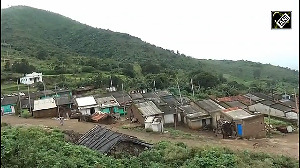'I know by experience that they can put a dagger in our back at any time...'
'It was a state of total chaos. Nobody knew what was happening. The fog of war was so thick that nobody could see anything... It is an experience which marked everybody's life.'
Brigadier Amarjit Singh Behl (retd), then a second lieutenant, and his men fought to the end before being taken prisoners of war by the Chinese in the 1962 Indo-China war.
Then a 21 year old, the soldier looks back at a war fought in extremely difficult circumstances and life as a Chinese PoW in this interview to Rediff.com's Claude Arpi.
Part I of the exclusive interview: 'We were told the Chinese will come in waves'
Did they capture a lot of arms and ammunitions?
They must have; also trucks and other equipment from south of Tawang till the Assam border. As far as the 7 Brigade is concerned, it was totally and entirely an on-foot battle. A battle of the fit men only!
From Tawang to Bridge III, it was between 5 and 7 days walk. You had to be strong and I was strong, I was only 21 years old.
With my boys, I walked from Ziminthang to Tsangdhar in 16 hours only.
On October 21, we were kept near the helipad and I saw the two officers who had been killed near their chopper. I went to the Chinese officers who had interpreters in English and Hindi (while in the Chinese prisoner of war camp, they also would speak Gorkhali and Punjabi).
I asked this officer, I want to bury these officers; after I insisted, he said 'Alright'. With two of my boys, we dug a 2-feet trench and buried Major Ram Singh and Squadron Leader Sehgal. We saluted them.
The next night (October 21-22) we stayed on there.
On the 22nd morning, we walked till Bridge III on the Namkha chu where we stayed for the night. Then we went to Khenzimane (the Indo-Tibet border) and the next day, we reached Le village on Nyamjiang chu in Tibet.
We stayed for two days in Le and moved to Marmang where we spent two nights before being taken in trucks to the PoW's camp near Tsetang in central Tibet.
Were you fed properly?
The Chinese were not well off themselves. I could see this. We had to eat rice and radish for breakfast, lunch and dinner. We had to survive with this.
From Marmang, it took us three days and nights to reach the camp. They had proper roads. After all, Tibet is a plateau. You remove a few stones and you can drive on it.
They kept the majors and the four lieutenant colonels in two blocks; the captains and JCOs were in other houses (though later, they were separated), all around the Chongye monastery (in Yarlung Valley). Nobody lived in the monastery itself.
Gorkhas were kept separately, so were the jawans.
There were 4 PoW camps in Tibet. Ours was only for the 7 Brigade. There were four companies (our boys [17 Parachute Field Regiment], 4 Grenadier, 2 Rajput and 9 Punjab).
The 1/9 Gorkhas were kept separately, they wanted to show that Chinese and Gorkhas are related, they were given a better deal. Brigadier John Dalvi was taken to a commune and kept in solitary confinement; he was a very isolated man.
For a few days, jawans kept pouring in the camp. There were some 500 jawans from the 7 Infantry Brigade, 10 JCOs, 3 majors, 4 lieutenant colonels and 9 other officers.
Did you have proper clothing?
When we received our marching orders on September 24, we had sent a detachment to Kanpur to get warm clothes. I had a parka. We suffered less that some others. There were troops with just an angora shirt, not even a jersey.
After a few weeks, the Chinese gave us padded cloth, what they themselves were wearing. All of us slept on the hay, but being an unmarried man, I could sleep anywhere. I did not worry about anything.
My family got two telegrams: '2nd Lt Behl missing, believed dead.' My uncle went to meet General P P Kumaramangalam (later thw army chief) who said 'Forget about that boy, he is dead.'
Later, the Chinese gave the names of the prisoners to the Indian Red Cross. My name was in it. My parents knew then that I was alive; it was around New Year. About that time, we received parcels from the Red Cross (tooth paste, tooth brush, a sweater and sweets, etc).
Did they try to demoralise you?
They thought that they knew everything, but they only wanted to find out what they liked to hear. The interpreters would brainwash us daily. They asked questions like this: "What is the relation between generals and officers or officers and jawans?"
We always answered that our relations were good. I say with pride that my 38 boys, though they were not staying in the same block in the PoW's camp, obeyed my orders 100 per cent from day 1 till the last day.
For example, I had not cut my hair nor did my boss Captain Talwar. My boys would once in the month secretly bring hot water to have a bath at 2 am. One of my jawans brought me tea (without milk and sugar) every day during the time we were prisoners. He knew I was fond of my tea.
He would come: "Ram, Ram, Sahib" and give me my tea. The Chinese did not know about it. Our house was near the kitchen and he was working there.
In the mornings, the Chinese gave us, Atta Chapati with some radish. For lunch and dinner, the menu was radish with rice. We survived. And 2 or 3 times, they gave us tins of pork. It was cooked with the rest and we were quite happy.
Did they try to make you admit that India attacked China?
There was an interpreter, Lieutenant Tong who used to say: "You attacked us." I answered: "No, we had nothing (to attack you)". He pushed me around and that was it.
The Chinese interpreters are like robots. If, in the morning, they are told, 'You should be nice with the prisoners', they would befriend us; if they were told, 'Be rude', they were very rude.
The Chinese have a very peculiar way of discussion or brainwashing. They would read out some news and ask us, "What you have to say?" We would answer: "I have nothing to say". They would then ask us to write our comments. The officers and men remained very stubborn and did not believe what they said.
I was anti-Chinese, I am and will remain anti-Chinese because I know by experience that they can put a dagger in our back at any time.
During my stay, I planned for an escape with Captain Talwar and Captain Kohli. I would report sick every day and collect medicine.
Some other PoWs mentioned that there was a beautiful lady doctor.
Yes, everybody used to report sick to see her. But my objective was only to collect medicines. The Chinese had basic medicines, further they were practicing acupuncture. We planned to take the direction of the sun and then follow the route that we had taken to escape.
When did you learn about the cease-fire?
Two or three days after the cease-fire through the public address system. They used to give their own news in Hindi. They used to play songs: 'Everywhere it is resounding that Indians and Chinese are brothers'.
How were you repatriated?
We were taken by the same road, except that we crossed at Bumla where we were handed over to the Indian Red Cross. By that time the Chinese had built a road between Bumla and Tawang. They built it in one month.
The point is that there is no mercy, no feelings, no democracy in their books: they brought people from Tibet and along with local Monpas, they made them work. They must have known the topography of the place by taking air photos. They knew the area well.
How do you explain that there is no photograph of the operations from the Indian side?
Obviously the Chinese being the winners had all the time to take pictures and use it for their propaganda.
Were the PoW camps ready months in advance to receive prisoners?
No, they were not. These houses had no windows and no door. They put some hay and that was it. No preparation was required. We had 2 or 3 mugs of water by day. The river was located at about 1 1/2 km.
Captains, lieutenants and other ranks had to carry water once in ten days. Senior officers were exempted.
What about the decorations? Some say that many were not merited.
It is not that all people who are decorated are brave and those not decorated are cowards.
But I want to tell you that NOBODY from the 7 Infantry Brigade received an order to withdraw to the best of my knowledge. Whosoever has withdrawn, withdrew on their own.
Some have been decorated, some not, it proves nothing. It is true that some people may not have deserved it, but that was it. The government probably wanted to show the nation, that the army fought well, therefore decorations were given.
Remember that it was a state of total chaos. Nobody knew what was happening. The fog of war was so thick that nobody could see anything.
It is an experience which marked everybody's life.
In the Western sector, 13 Kumaon gave the Chinese a good fight in Chushul (Ladakh).
Though I was a carefree man, it was a harrowing experience. But even when people were running away, neither I nor my jawans thought of abandoning our post. We kept fighting, fighting.
Please read: Remembering A War







 © 2025
© 2025